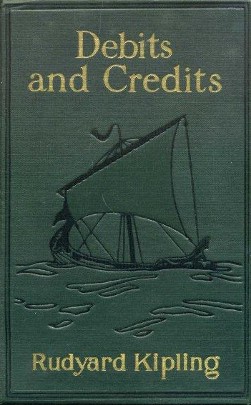Debits and Credits (Kipling) on:
[Wikipedia]
[Google]
[Amazon]
 ''Debits and Credits'' is a 1926 collection of fourteen stories, nineteen poems, and two scenes from a play
''Debits and Credits'' is a 1926 collection of fourteen stories, nineteen poems, and two scenes from a play
/ref> by
Debits and Credits
' at Project Gutenberg Australia
{{Rudyard Kipling 1926 poetry books 1926 short story collections English poetry collections Poetry by Rudyard Kipling Short story collections by Rudyard Kipling
 ''Debits and Credits'' is a 1926 collection of fourteen stories, nineteen poems, and two scenes from a play
''Debits and Credits'' is a 1926 collection of fourteen stories, nineteen poems, and two scenes from a play/ref> by
Rudyard Kipling
Joseph Rudyard Kipling ( ; 30 December 1865 – 18 January 1936)''The Times'', (London) 18 January 1936, p. 12. was an English novelist, short-story writer, poet, and journalist. He was born in British India, which inspired much of his work.
...
, an English writer who wrote extensively about British colonialism
Colonialism is a practice or policy of control by one people or power over other people or areas, often by establishing colony, colonies and generally with the aim of economic dominance. In the process of colonisation, colonisers may impose the ...
in India and Burma. Four of the poems that accompany the stories are whimsically presented as translations from the "Bk. V of Odes" by Horace, but are actually poems by Kipling imitating the style of the Roman poet.
Contents
Stories
*"The Enemies to Each Other" : The story ofAdam and Eve
Adam and Eve, according to the creation myth of the Abrahamic religions, were the first man and woman. They are central to the belief that humanity is in essence a single family, with everyone descended from a single pair of original ancestors. ...
retold in the style of a Muslim fable
*"Sea Constables: a Tale of ’15"
: Weekend sailors turned naval officers discuss their patrolling of the coast over dinner
*" 'In the Interests of the Brethren' "
: An account of the generous hospitality of a Masonic Lodge
A Masonic lodge, often termed a private lodge or constituent lodge, is the basic organisational unit of Freemasonry. It is also commonly used as a term for a building in which such a unit meets. Every new lodge must be warranted or chartered ...
in wartime
*"The United Idolaters"
: A tale of school life, in which Stalky & Co discover ''Uncle Remus
Uncle Remus is the fictional title character and narrator of a collection of African American folktales compiled and adapted by Joel Chandler Harris and published in book form in 1881. Harris was a journalist in post-Reconstruction era Atlanta, a ...
'' and outrage a new master
*"The Wish House"
: An old Sussex woman talks about the love of her life and the price she paid for loving him
*"The Janeites"
: A still-bewildered old soldier recalls how he came to join a 'secret society' of Jane Austen admirers and gives his own unique take on her oeuvre
*"The Prophet and the Country"
: A stranded motorist meets an exiled American who explains his passionate objection to Prohibition
Prohibition is the act or practice of forbidding something by law; more particularly the term refers to the banning of the manufacture, storage (whether in barrels or in bottles), transportation, sale, possession, and consumption of alcohol ...
*"The Bull that Thought"
: A story about an uncannily intelligent bull with a flair for the bullfight
Bullfighting is a physical contest that involves a bullfighter attempting to subdue, immobilize, or kill a bull, usually according to a set of rules, guidelines, or cultural expectations.
There are several variations, including some forms wh ...
*"A Madonna of the Trenches"
: After the war, a soldier reveals the true cause of his "shell-shock"
*"The Propagation of Knowledge"
: A tale of school life, in which Stalky & Co bait their English master with the '' Curiosities of Literature'' and the Baconian theory
The Baconian theory of Shakespeare authorship holds that Sir Francis Bacon, philosopher, essayist and scientist, wrote the plays which were publicly attributed to William Shakespeare. Various explanations are offered for this alleged subterfuge ...
*"A Friend of the Family"
: An Australian soldier avenges his friend by waging war on the home front
*"On the Gate: a Tale of ’16"
: A fantasy in which St Peter and the administrators of Heaven struggle to cope with the surge of souls from the war
*"The Eye of Allah"
: In a mediaeval abbey, an artist shows some doctors an early microscope
A microscope () is a laboratory instrument used to examine objects that are too small to be seen by the naked eye. Microscopy is the science of investigating small objects and structures using a microscope. Microscopic means being invisi ...
, which provokes debate
*"The Gardener"
: A story about respectability and mother-love
Poems
*The Changelings *The Vineyard *‘Banquet Night’ *To the Companions (Horace, ode 17, Bk. v.) *The Centaurs *‘Late Came the God’ *Rahere
Rahere (pronounced ), or Raher or Raherius, was an Anglo-Norman priest and monk. He was a favourite of King Henry I and is most famous for having founded the Priory of the Hospital of St Bartholomew in 1123.
Many of the details of Rahere's li ...
*The Survival (Horace, Ode 22 Bk. v.)
*Jane’s Marriage
*The Portent (Horace, Ode 20, Bk, v.)
*Alnaschar and the Oxen
*Gipsy Vans
*The Birthright
*A Legend of Truth
*We and They
*The Supports
*Untimely
*The Last Ode: Nov. 27, B.C. 8 (Horace, Ode 31, Bk. v.)
*The Burden
Play Fragments
*Gow’s Watch : Act IV. Sc. 4 *Gow’s Watch: Act V. Sc. 3References
External links
* Full text ofDebits and Credits
' at Project Gutenberg Australia
{{Rudyard Kipling 1926 poetry books 1926 short story collections English poetry collections Poetry by Rudyard Kipling Short story collections by Rudyard Kipling